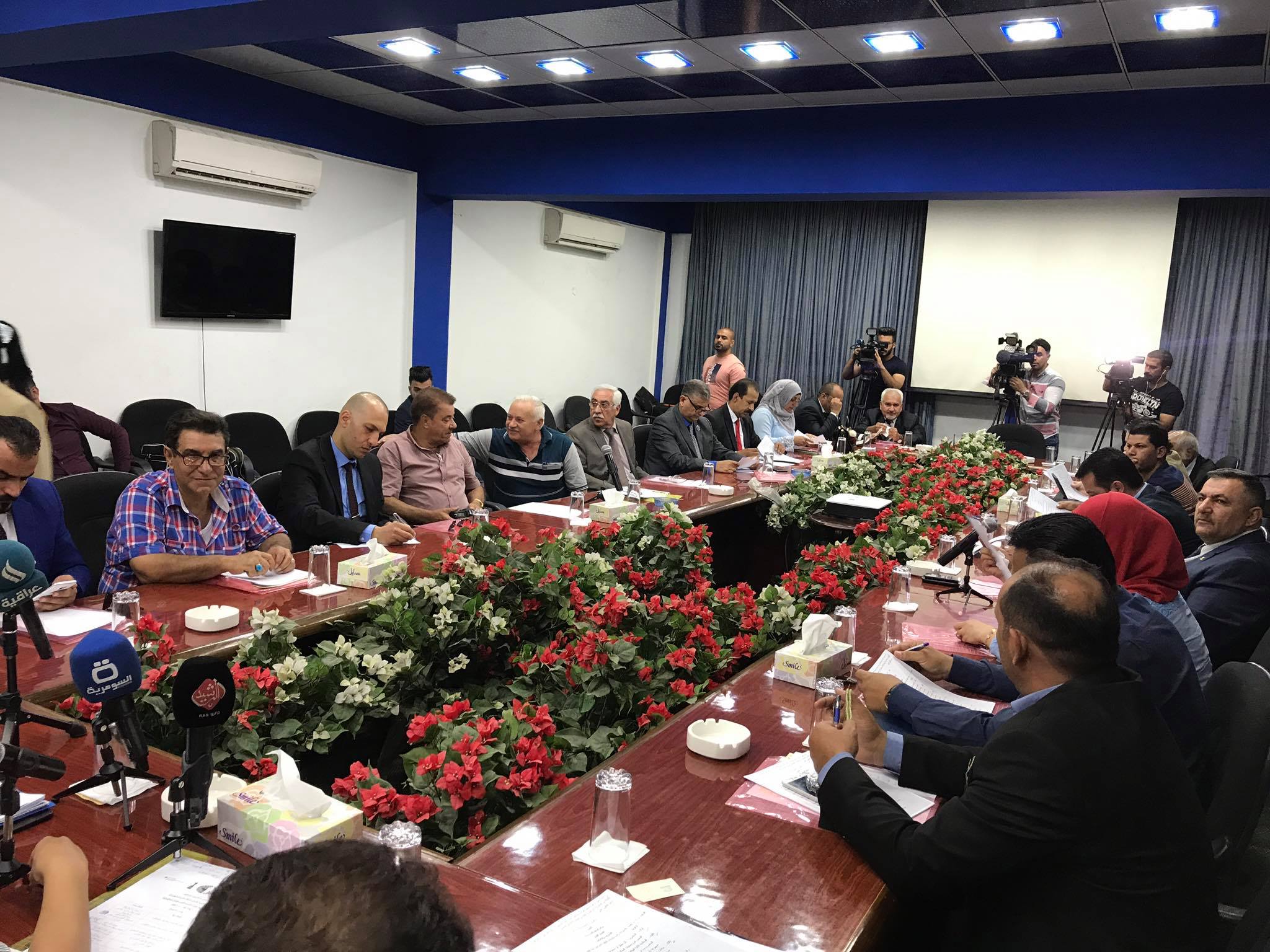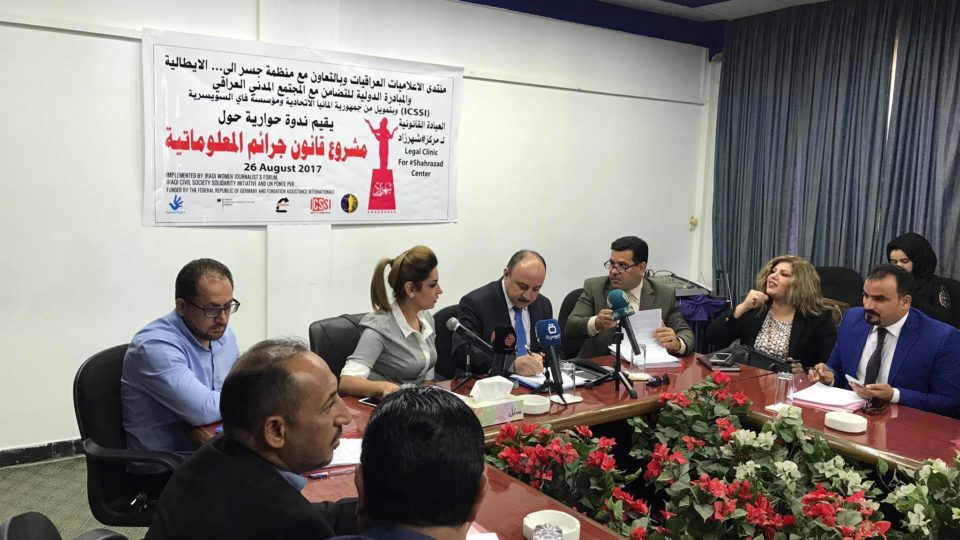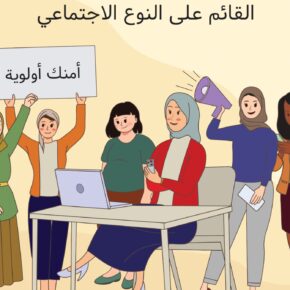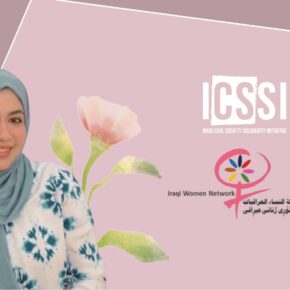New Draft Law Threatens Freedom of Expression on the Internet
 Iraqi Women Journalist Forum and Iraqi Civil Society Solidarity Initiative – 28 August 2017
Iraqi Women Journalist Forum and Iraqi Civil Society Solidarity Initiative – 28 August 2017
On 26 August 2017, the Iraqi Women Journalist Forum held a seminar in Baghdad on the draft law on internet censorship. Though no precise date has been announced, this proposed law, the ‘Informatics Crime Law’, is set to be delivered to the Iraqi Parliament in the near future, and thus action is required now. Ostensibly in place to protect users and promote cyber safety, the draft law in fact poses serious threats to freedom of expression on the internet. A successful campaign to remove this draft law was launched in 2012-13 by the Iraqi Network for Social Media (https://www.facebook.com/IN4SM) with support from a number of other civil society organizations, both local and international (for more information about that campaign: http://www.iraqicivilsociety.org/archives/1124). While the campaign was successful — the president of the parliament approved their request, and the process of drafting this law was stopped — the draft law has returned, and once again poses threats to basic rights.
The seminar started with a paper by Salah Al-Karboli, a legal advisor in the parliament, which reviewed the stages a draft law goes through after its initial submission to parliament, all the way to becoming a law — or being rejected. He went over the articles on which the parliament gave notes, and explained the conclusions they reached after the second reading of the draft law. He also went over the most important recommendations that came out of the meeting of the relevant committees in parliament, which reviewed parallel experiences and legislation in other countries, as well as laws related to the draft in the Iraqi Constitution.
The director of the Legal Department at the Ministry of Communications, Mr. Imad Al-Shammari, pointed out that the classification of informatics related crimes are divided into several types by international agencies, including crimes relating to information safety, and issues regarding intellectual property. Al-Shammari added that Iraq needs to pass a law that protects citizens from hackers, fraud, identity theft, racism and hatred. However, the law cannot sanction censorship — ‘protection’ cannot come at the expense of freedom of expression. Thus, the law must be written carefully, by those who specialize in the field, and who are capable of finding the fragile balance between freedom and security.
A representative from UNESCO, Mr. Diaa Al-Sarrai, pointed out that there are many peculiarities about this draft law, including the fact that its own articles do not match its name, and that it uses a definition of ‘informatics’ that is different from that which is given by the UN. He added that the draft was written hastily, and is based largely on laws of neighboring countries, many of which are extremely restrictive of citizens’ most basic freedoms. If approved in its current form, Al-Sarrai said, the draft law would limit freedom of expression and threaten the security of activists and the media.
The seminar included an open discussion between the lecturers and the attendees, in which Dr. Bushra Obeidi, the legal adviser of IWJF, explained that the name of the law should be, ‘Electronic Sites Crimes’, because this is more accurate: most crimes today occur on social networking sites, and if apprehended, perpetrators of abuse (such as, libel and extortion) should have restrictions placed on them.
The director of the Information of National Wisdom Movement (NWM), Mr. Baligh Abu Kalal, stressed that the NWM will not vote on this draft law because current government institutions are not yet strong and clear enough about their policies surrounding informatics. He insisted that before such a law is passed, there must be a national strategy in place which works to deter people from committing electronic crimes by spreading a culture of citizenship, tolerance and inclusion. He concluded that the passage of the draft law in its current form would be similar to that of Article 4 of the law on terrorism crimes, because like that law, it too threatens to restrict freedom of expression.
President of IWJF, Ms. Nibras Al-Mamouri, explained that the objective of the seminar was a clear sense of how to intervene in the process by which a draft law becomes law so that changes can be implemented which ensure the protection of the rights and freedoms guaranteed by the constitution. She stressed that the draft contains loose and ambiguous phrases which might be used punitively. Instead, the law should be an educational law that urges people to use the internet correctly, without harming themselves or others. Such a law requires specialized training on how to legislate and implement it.
This seminar was put on by the Shahrazad Project in cooperation with the Italian Organization, Un Ponte Per… and the Iraqi Civil Society Solidarity Initiative, with funding from the Federal Republic of Germany and the FAI Foundation.





